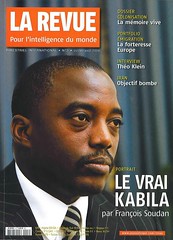
President Joseph Kabila on cover that reads "La Revue". The Democratic Republic of Congo has established joint military monitoring agreements with neighboring Rwanda and Uganda in order to curb rebel activity in the eastern region of the country.
Originally uploaded by Pan-African News Wire File Photos
06/04/2010 04:06
Congo calls for UN force to leave
UN Secretary General Ban Ki-moon refused to confirm a date for the pull-out of peacekeepers from Congo
Congo's president has called for the UN's 20,000-strong peacekeeping force to leave before September 2011 so the country can "fly with its own wings," but the UN secretary-general is not signing off on a date, according to a report.
Ban Ki-moon said he wants to ensure that military operations against rebels in eastern Congo are successfully completed, that well trained and equipped Congolese army units can take over the UN force's security role, and that the government extends its authority in areas freed from armed groups before the largest UN peacekeeping operation in the world departs.
The secretary-general did recommend in the report to the Security Council that the withdrawal start immediately with up to 2,000 troops leaving peaceful areas of the central African nation by June 30, the 50th anniversary of Congo's independence.
President Joseph Kabila initially wanted the UN force, known by its French acronym MONUC, out of Congo before the independence celebrations. But following a visit to Kinshasa last month by UN peacekeeping chief Alain Le Roy, where Kabila stressed "that it was now time to allow the country to fly with its own wings," the government "decided to be more flexible and shift that date to August 30, 2011," the report said.
Congo was engulfed in civil wars from 1996 to 2002, drawing in half a dozen nations and leading to deployment of the UN force in 1999 to support implementation of a ceasefire that was repeatedly broken. Following a 2002 agreement that ended much of the fighting, MONUC has supported the reunification of the country and the country's first democratic elections in more than four decades in 2006, which Kabila won.
Kabila's government, however, has since struggled to assert its control in the east and has had difficulty building effective institutions and integrating former fighters into a national army.
Ban took note of Kabila's desire for all UN troops to be gone by September 2011, but did not endorse it.
An assessment team he sent to Congo recommended withdrawing the UN force over a period of three years if the security situation continued to improve and the government accomplished a series of "critical tasks," according to the report.
The team concluded that "a continued significant presence of the MONUC force was essential in the Kivus and Orientale provinces" in the volatile east, but not in the other eight provinces where the government could independently maintain law and order and protect civilians, the report said.
The secretary-general said the 50th anniversary of Congo's independence provides an opportunity for the government and people "to turn the page on a period of the country's history that has too often been disfigured by conflict and violence".
No comments:
Post a Comment